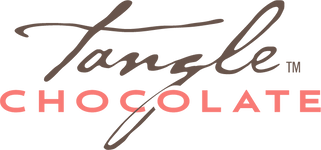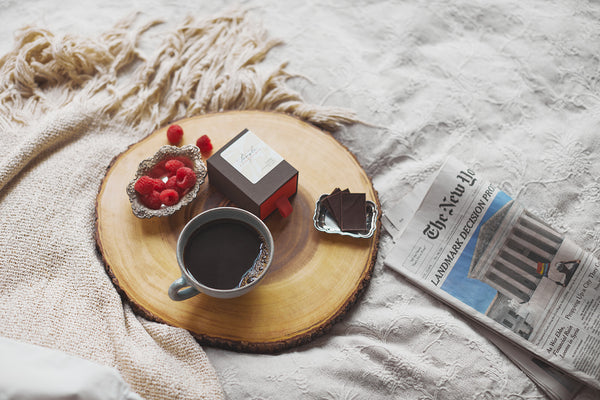IS THERE CAFFEINE IN MY CHOCOLATE?
Jan 07, 2021
It’s time to set the record straight once and for all––does chocolate actually have caffeine? Should you not drink hot chocolate before bed? Can a chocolate bar replace your morning cup of joe? The answers to these questions are a bit more complicated than a simple yes or no.
To start, it’s important to know that when people talk about caffeine in chocolate, many times they are actually referring to a different stimulant called theobromine. We'll get to that in a minute. First, let’s talk caffeine. Chocolate does have some caffeine, but not nearly as much as your morning cup of coffee or tea. For comparison, a cup of coffee has 138 milligrams of caffeine, and one ounce of dark chocolate (the amount of chocolate in our Act of Kindness box) has only 12 milligrams of caffeine.
The caffeine content of your chocolate also depends on what type of chocolate you’re eating. For example, dark chocolate has more caffeine than milk chocolate, because dark chocolate has more cacao solids, which is where caffeine is found. One ounce of milk chocolate has about 9 mg of caffeine, compared to dark chocolate’s twelve. White chocolate has no cacao solids, and therefore no caffeine.
People who regularly drink coffee or tea probably won’t be too affected by the caffeine in chocolate, but there’s another culprit for your post-chocolate alertness or insomnia. Cacao contains theobromine, a stimulant that is somewhat similar to caffeine. It can make you feel more awake, but in a milder, smoother way than caffeine might. It can also raise your heartrate, and it lasts longer in the body than caffeine does. Importantly, it also has health benefits such as lowering your blood pressure and increasing blood flow to the brain. People have different levels of sensitivity to theobromine. Some folks can’t eat chocolate late in the day if they want to sleep well, while others can enjoy a late night cup of hot chocolate or slice of cake without any negative consequences. For many, it’s the combination of caffeine and theobromine that causes sleeplessness after eating chocolate.
While you might have a certain sensitivity level to caffeine, keep in mind that that’s not the only thing at play here. However, theobromine can also be found in coffee and tea, so you might have a similar tolerance for theobromine as you do for caffeine. Whether or not chocolate will keep you up at night or energize you in the morning depends on the person and the type of chocolate.
Setting aside questions of caffeine in chocolate versus coffee, the flavors of the two pair beautifully. We have a partnership with local YUP Coffee Roasters that enables us to offer excellent coffee-infused chocolate THINS in all three box sizes. Served with or without a cup of coffee, the coffee-infused chocolate is quickly becoming a favorite of many.
https://www.candyclub.com/blog/caffeine-in-chocolate/


